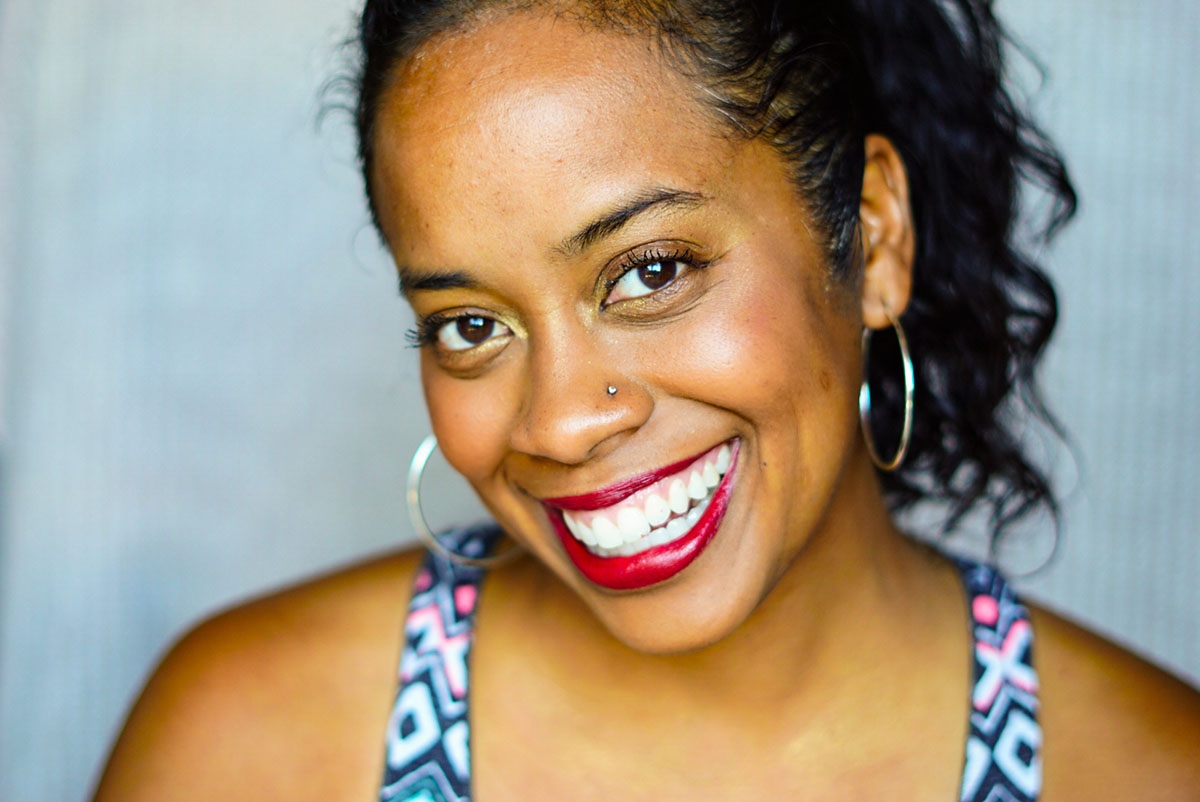Director, actor and Everyman Resident Company Member Paige Hernandez knows what it’s like to grow up in two worlds. Hernandez, who is black, spent the early part of her childhood living in an African-American neighborhood near Druid Hill Park and later, moved with her family, to the predominantly Jewish neighborhood of Park Heights in Northwest Baltimore.
“All of a sudden, I had my black friends in Druid Hill and my Jewish friends in Cross Country,” said Hernandez.
The experience helped her to identify with Jaqueline Marie Butler, the young protagonist of award-winning playwright Caleen Sinnette Jennings’ one-woman shows “Queens Girl in the World” and “Queens Girl in Africa.” Hernandez will direct the world premiere repertory of the plays for Everyman Theatre beginning with “Queens Girl in the World,” starring Everyman’s Dawn Ursula. The show opens May 7. “Queens Girl in Africa,” starring Erika Rose, opens May 14 and the two plays will run simultaneously through June 23. Theater-goers are encouraged to see both plays, since they follow a chronological storyline, but either play stands on its own, says Hernandez.
In advance of opening night, Jmore spoke with Hernandez about the play and what it’s like to direct “Queens Girl” in repertory.
Jmore: Please tell us about the plays and their relationship to each other.
Paige Hernandez: These two stories are based on the actual autobiographical experiences of the playwright. She really had, has, a remarkable life. She grew up during the 1960s in [Astoria] Queens and her family was very close to famous civil rights activists. Malcolm X was a neighbor and her father was there at the Audubon Ballroom [in Harlem] when he was shot. [Actor/activists] Ruby Dee and Ossie Davis were friends … She is still friends with the [William Edward Burghardt] Du Bois family. So she went to this mostly Jewish school in Greenwich Village in Manhattan. But then things get a little crazy with the assassination of JFK, [civil rights activist] Medgar Evers, the four girls killed in Alabama and her family decides to leave the U.S. and she’s uprooted to Nigeria.
They try to make a new life there only to find they are in the midst of the Nigerian Civil War!
Tell us about your experiences living in Park Heights and how that helps you relate to Jacqueline.
There’s one part of the play where Jackie says, ‘I feel like I’m two people in one person. I have two different me[s].’ At the time when I was growing up, I didn’t know about the term ‘code-switching.’ But that was what it was, switching back and forth between languages, mannerisms, appearances… to be accepted, embraced or simply to fit in. African-Americans do this daily [when they’re in] a mostly white environment. Jackie lives this in the extreme when she goes from a black neighborhood to a Jewish school.
After I moved from Druid Hill to Park Heights, I had these really great Jewish friends who taught me my Aleph Bet and Shabbat and prayers. We kept kosher in the house so my friends could come over. I lived next door to a rabbi. My parents still live there and my friends [from Park Heights] come to the plays.

What’s it like to direct adult women who are playing girls?
Well, I’m also a performer but in the last five or six years I’ve moved more toward directing. As a performer, many of my roles have been playing a child and doing children’s theater. So, I was 25, 35, playing a teenager. There’s something pretty incredible about bringing the lived experience of a grown woman to playing a teenager. I’m mindful of making sure we don’t dumb down teenage characters. We need to realize how sophisticated kids are so we … present them in a nuanced, authentic way.
The plays deal with social and political issues. Will they resonate with today’s audiences?
Both plays are about [in part] unrest, uneasiness about racial injustice — issues that just haven’t gone away. We see history repeating itself. ‘World’ looks at American issues like equal rights and class, while ‘Africa’ looks at intertribal conflict sparked by colonization. [Both plays convey] the same feelings of not being heard or seen and not having one’s work appreciated.
The ‘Queens Girl’ plays are both one-woman shows. Tell us about that.
Yes, Dawn [Ursula] plays Jackie in ‘World’ when [the character] is about 10 to 14-years-old. Erika plays Jackie in ‘Africa,’ when she’s 14 to 16 or 17. Dawn won a Helen Hayes award for best actress for ‘World’ in 2016 and Erika [Rose] is up for the [Helen Hayes] Best Actress award for ‘Africa.’ We’ll find out [if she won] on May 13! Caleen [Sinette Jennings] is up for the [Helen Hayes] Best New Play for ‘Africa.’
[Hernandez has also been nominated for the Helen Hayes award for Best Director for ‘Africa.’]
Solo performances are like an athletic sport. They take stamina, endurance… I think this is understated. It’s so good for audiences to see [solo shows] when they’re done well. Each actor plays about 12 different characters in 90 minutes. Audiences will also get to see two different actors play the same character so they’ll see two different interpretations.
It’s rumored that there will be a third ‘Queens Girl’ play. Is it true?
Yes. Everyman has commissioned a third show that will premiere in 2020. That play will pick up where ‘Africa’ leaves off. It begins when Jackie is back in the states and enrolling at [Bennington College]. The working title is ‘Queens Girl: Black in the Green Mountains.’ Everyman audiences who see the first two shows will have the inside track. They can get on board to see what happens next!
For tickets and more information, visit everymantheatre.org.





